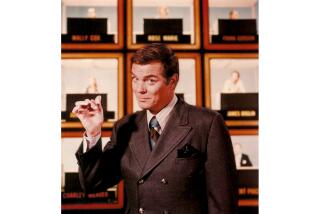Jan Murray, 89; Borscht Belt Comic, Early Game Show Host
Jan Murray, one of a generation of comics who honed their skills on the Borscht Belt before conquering television -- in Murray’s case, as one of the medium’s early game show hosts -- died at his Beverly Hills home Sunday. He was 89 and had been in poor health for the last few months, according to his daughter, Celia.
Murray emceed nine game shows during television’s golden era. One of the most popular was “Treasure Hunt,” which aired on ABC and later NBC from 1957 to 1959, in which the contestant who gave the most correct answers chose one of 30 “treasure boxes” for a prize, which was not always delightful. It could have been anything “from a head of cabbage to a check for a large sum of money,” according to the book “The Complete Directory to Prime Time Network TV Shows.”
For the record:
12:00 a.m. July 5, 2006 For The Record
Los Angeles Times Wednesday July 05, 2006 Home Edition Main News Part A Page 2 National Desk 0 inches; 23 words Type of Material: Correction
Murray obituary: An obituary in Tuesday’s California section of comedian Jan Murray said he was born Murray Jankowski. His family name was Janofsky.
For The Record
Los Angeles Times Friday July 07, 2006 Home Edition Main News Part A Page 2 National Desk 1 inches; 50 words Type of Material: Correction
Murray obituary: An obituary of comedian Jan Murray in Tuesday’s California section said that he moved to Los Angeles in 1965 and found work in TV series such as “Car 54, Where Are You?” Murray appeared in that sitcom, which ran from 1961 to 1963, before moving to Los Angeles.
Murray also hosted “Blind Date,” “Chain Letter,” “Dollar a Second,” “Go Lucky,” “Charge Account,” “Meet Your Match,” “Sing It Again” and “Songs for Sale.” He also starred in a short-lived variety show for NBC, “Jan Murray Time,” with co-host Tina Louise.
Although highly successful in game shows, Murray shifted to movies in the late 1960s and appeared in a variety of roles, including a Nazi war criminal in “A Man Called Dagger” (1967) and Annette Funicello’s father in “Thunder Alley” (1967).
Born Murray Jankowski in New York City, he grew up going to 25-cent vaudeville shows with his mother. When she got sick and could not attend, he found a way to keep her entertained.
“I used to come back, stand at the foot of her bed and describe the whole show -- the tricks the opening juggler act did, the female performer and what she wore and what she sang,” Murray told the Jewish Journal of Greater Los Angeles last year. “But when it came to the comedian, I knew his whole ... act.”
By 18 he was performing at the Melody Club in Union City, N.J., a two-hour commute by subway and train.
Soon he was a regular at Catskills resorts, practicing his routines on “the fat ladies in the exercise room.” He was a “tummler,” Yiddish for an all-around entertainer.
It was invaluable experience.
“Let’s say I polished my timing on the Borscht Belt,” he told The Times in 1966.
“Being in a resort area, you would play to practically the same audience every night, only you’d do different things. One night I’d do stand-up comedy, the next night I’d be the emcee, and then we’d have game night and campfire night, when we’d just tell stories, and then an evening of drama. Every day you were something else.”
Murray was a headliner in vaudeville and Las Vegas through the 1940s and ‘50s, until the advent of television offered a new direction. His first game show was “Songs for Sale,” in which aspiring songwriters had their creations performed by professionals, including Rosemary Clooney and Tony Bennett, who were then relatively unknown. He hosted the NBC show for a year until Steve Allen took over in 1951.
After a decade as “one of television’s most formidable hosts,” in the words of one critic, Murray took some acting classes and found them so stimulating that he began turning down lucrative Vegas gigs to act in summer stock.
In 1965 he moved to Los Angeles and found work in films and on TV series such as “The Lucy Show” and “Car 54, Where Are You?”
His Jewish faith was central to his life. On high holidays he attended services at not one but three temples. He performed in Israel to raise funds for Hebrew University. And he was fabled for his Passover Seder, where his regular guests over two nights included Sid Caesar, George Burns, Buddy Hackett, Jerry Lewis and Jackie Gleason.
“I led a serious Seder. Then, after dinner,” he told the Jewish Journal, “we’d tummel until 3, 4 in the morning.”
Murray performed comedy into his 80s. “You get exhausted when you’re 80,” he told the Jewish Journal. “Until I was 80, I wasn’t exhausted. There’s no medicine like being onstage hearing people laugh.”
He quit performing at 83, when his worsening asthma threw off his timing.
In addition to his daughter, who lives in Apple Valley, he is survived by his second wife, Toni; two sons, Howard and Warren of Los Angeles; another daughter, Diane, also of Los Angeles; eight grandchildren; and two great-grandchildren.
A funeral service will be held at noon Thursday at Hillside Memorial Park, 6001 Centinela Ave., Los Angeles.
More to Read
The complete guide to home viewing
Get Screen Gab for everything about the TV shows and streaming movies everyone’s talking about.
You may occasionally receive promotional content from the Los Angeles Times.







